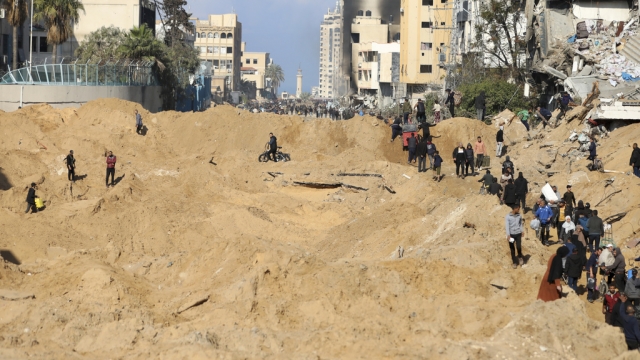Israel's neighbors and key mediators warned Saturday of disaster and repercussions if its military launches a ground invasion in Gaza's southern city of Rafah, where Israel says remaining Hamas strongholds are located — along with over half the besieged territory's population.
Israeli airstrikes killed at least 44 Palestinians — including more than a dozen children — in Rafah, hours after Prime Minister Benjamin Netanyahu said he asked the military to plan for the evacuation of hundreds of thousands of people ahead of an invasion. He gave no details or timeline.
The announcement set off panic. More than half of Gaza's 2.3 million people are packed into Rafah, which borders Egypt. Many fled there after following Israeli evacuation orders that now cover two-thirds of the territory following the Oct. 7 Hamas attack that sparked the war. It's not clear where they could go next.
Egyptian Foreign Minister Sameh Shoukry said any Israeli ground offensive on Rafah would have "disastrous consequences," and asserted that Israel aims to eventually force the Palestinians out of their land. Egypt has warned that any movement of Palestinians into Egypt would threaten the four-decade-old peace treaty between Israel and Egypt.
Another mediator — Qatar — also warned of disaster, and Saudi Arabia warned of "very serious repercussions." There's even increasing friction between Netanyahu and the United States, whose officials have said a Rafah invasion with no plan for the civilians who are crowded together there would lead to disaster.
"The people in Gaza cannot disappear into thin air," German Foreign Minister Annalena Baerbock said on X, adding that an Israeli offensive on Rafah would be a "humanitarian catastrophe in the making."
President Joe Biden has said Israel's response is "over the top." Netanyahu's office says it is impossible to eliminate Hamas while leaving four Hamas battalions in Rafah.
SEE MORE: Are we prepared for a future of drone warfare?
Israel has carried out almost daily airstrikes in Rafah, a rare entry point for Gaza's badly needed food and medical supplies, during its current ground combat in Khan Younis just to the north.
Overnight into Saturday, three airstrikes on homes in the Rafah area killed 28 people, according to a health official and journalists who reported on the bodies they saw arriving to hospitals. Each strike killed multiple members of a family, including a total of 10 children — the youngest 3 months old.
Fadel al-Ghannam said one strike tore his loved ones to shreds. He lost his son, daughter-in-law and four grandchildren. He fears even worse with a ground invasion of Rafah, and said the world's silence has enabled Israel to proceed.
On Saturday, Israel's military said it had discovered tunnels underneath the main headquarters of the U.N. agency for Palestinian refugees in Gaza City, alleging that Hamas militants used the space.
An Israeli airstrike on the central town of Deir al-Balah killed five people and wounded about 10 others, according to hospital officials and journalists.
In the Tel al-Hawa neighborhood of Gaza City, two medics from the Palestinian Red Crescent were found dead in a destroyed ambulance after going missing 12 days ago. They had tried to rescue 5-year-old Hind Rajab, who had been traveling with family to heed evacuation orders.
The PRC previously released a recording of a call from Hind’s cousin saying the car had come under fire and only she and Hind survived. The cousin went silent mid-call. Hind later died.The PRC said the rescue mission was coordinated with Israel’s military, which had no comment.
SEE MORE: Former CENTCOM commander discusses Gaza, wider conflicts
Later on Saturday, an Israeli airstrike on a home in Rafah killed at least 11 people, including three children, according to Ahmed al-Soufi, head of Rafah municipality.
"This is what Netanyahu targets — the civilians," said a neighbor, Samir Abu Loulya. Two other strikes in Rafah killed two policemen and three senior officers in the civil police, according to city officials.
In Khan Younis, Israeli forces opened fire at Nasser Hospital — the area's largest — killing at least two people and wounding five, according to the medical charity Doctors Without Borders. Israeli tanks reached the hospital gates on Saturday morning, Ahmed Maghrabi, a physician there, said in a Facebook post.
Health Ministry spokesman Ashraf al-Qidra said hospital staff are no longer able to move between buildings because of the intense fire. He said 450 patients and 10,000 displaced people are sheltering there.
The Israeli military said troops were not operating inside the hospital but called the surrounding area "an active combat zone."
Israel's army chief, Lt. Gen. Herzl Halevi, said more than 2,000 Hamas fighters in Khan Younis had been killed in airstrikes and ground combat, but the offensive in the city was far from over.
Israel declared war after several thousand Hamas militants burst across the border into southern Israel on Oct. 7, killing 1,300 people and taking 250 others hostage. Not all are still alive.
The Gaza Health Ministry said the bodies of 117 people killed in Israeli airstrikes were brought to hospitals over the past 24 hours, raising the overall death toll from the offensive to 28,064, mostly women and children. The ministry said more than 67,000 people have been wounded.
The United Nations says the city that's normally home to less than 300,000 people now hosts 1.4 million others who fled fighting elsewhere and is "severely overcrowded." Roughly 80% of Gaza’s people have been displaced.
Trending stories at Scrippsnews.com



